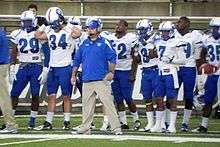Glenville State College
| Type | Public |
|---|---|
| Established | 1872 |
| President | Peter B. Barr |
| Students | 1,882 |
| Undergraduates | 1,882 |
| Postgraduates | 0 |
| Location | Glenville, West Virginia, USA |
| Campus | Rural |
| Mascot | Pioneers |
| Affiliations | Mountain East Conference |
| Website | glenville.edu |
 | |
Glenville State College (GSC) is a public four-year college located in Glenville, a town in the rural north-central part of the U.S. state of West Virginia.
History
Glenville State college was founded in 1872 to serve the higher education needs of Central West Virginia. Glenville State College has gained wide recognition for its teaching excellence. By 1910, the College enrollment had exceeded the population of Glenville and grew into a full four-year college by 1931. Teacher preparation continued to be the central mission as over the years, the campus became known as "the Lighthouse on the Hill" for both the quality of the teaching and the quality of Glenville State graduates. Today, Glenville State still maintains a strong focus on teacher preparation, while offering additional degree programs in relevant areas that support the needs of the workplace in the 21st century.
The Glenville State College Alumni Center, known as the John E. Arbuckle House, was listed on the National Register of Historic Places in 1991.[1]
Academics
The highest degree awarded is the Bachelor's degree. GSC also awards associate's degrees and certificates in several academic areas.
Athletics


In athletics, the school's sports teams are known as Pioneers and Lady Pioneers, and they compete in the Mountain East Conference. They have teams in football, basketball, track and field, softball, golf, baseball, cross country running, acrobatics & tumbling, and volleyball. They previously competed in the West Virginia Intercollegiate Athletic Conference, which disbanded following the 2012-13 season.
Student life
Glenville State College has over thirty active Student Organizations in the campus community. These groups include professional organizations, Greek organizations, special interest groups and honorary societies.
References
- ↑ National Park Service (2009-03-13). "National Register Information System". National Register of Historic Places. National Park Service.